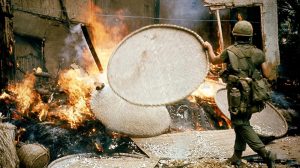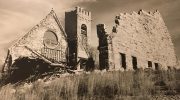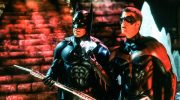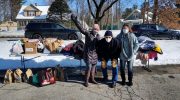The following short story is a work of fiction by Martin Holman. Any resemblance to real life (with the exception of the 2020 pandemic and the My Lai Massacre) is purely coincidental.

John Grayson coughs into his hand. It isn’t the first time in the last 36 hours, and he knows what he is going to have to do. He knows what he might be suffering from, but he doesn’t want to be treated like a modern day version of a leper, so he tells no one about his cough. Only his wife knows, and she silently stays away from him. She doesn’t say a word about it, and mills about the house cleaning and checking items off her to-do lists. That’s how Nancy has been over the last 51 years of their marriage. Sweet, supportive, and silent – or the triple threat – as John often jokes.
John and Nancy met in an army hospital in Vietnam 52 years ago. John woke up in the hospital, and the first thing his eyes rested on was Nancy. She smiled at him, and he knew he was in love, but that was the only thing he knew. John had been brought in to the hospital out cold. No one knew who brought him in or how long he had been passed out, but he slept in the hospital for four weeks before he woke up one morning. He had been through trauma, his body beaten and bruised. But he glanced at Nancy and jokingly asked her to marry him. She smiled and told him she’d give him some water. He said “thank you”.
Eventually he healed and was released to return home, never to fight in a war again. However, while he had the clothes on his back given to him by the army, that was the only thing he took with him back to the states. When he woke up, he couldn’t remember anything about his life. He had been a POW for a while at least, and the hospital was near where the 11th infantry brigade traversed. But when the squad leaders were asked if they knew Grayson (because he had no memory to answer their questions), Lieutenant Calley swore he had never seen him before. At a loss for what to do with him, the army shipped him back home, where they hoped he could see some doctors who could wake his memory.
He arrived in the US, and the doctors and specialists tried everything they could, but nothing worked. Grayson couldn’t remember his name, address, what he was doing in Vietnam, or who his family was. The army contacted all the missing persons reports, but nothing came up. No one looked for or cared about whoever this young man might be. So they gave him some money, and sent him on his way into a world he knew nothing about. The only thing that grounded Grayson was his consistent letters back to the one he first saw waking up, Nurse Nancy Maxwell.
John picked a name first. He wanted something sophisticated, so he looked through name books and Liked Grayson. One of his first routines was going to church. He moved an hour east of Boston to Worcester, Massachusetts, and found a Catholic Church near His apartment on Grafton St.. His first Sunday at St. Stephen’s Catholic Church, the priest spoke about John 3:16, “For God so loved the world that he gave his only begotten son, that whoever believes in him, shall not perish, but have everlasting life.” He liked that verse, so he called himself John Grayson.
Against her parent’s wishes and after she arrived back home, Nancy immediately moved from Marion, Ohio, a small rural town filled with corn fields and factories, to marry John and they became John and Nancy Grayson. Over time, her parents grew to love him and visited every chance they could, especially after the two children were born. Now 51 years into their marriage, her parents have passed on, and he still has no idea who his parents were or what he did before he woke up in that hospital. All he knows now is that he must go back into a hospital because of his dreaded dry cough. It’s gone on for several days, and the Coronavirus pandemic of 2020 is at high tide. He needs to get tested to see whether or not he has contracted the virus, but his desire to not go to the hospital and get tested is almost as great as his desire to be healed.
John drives himself to St. Vincent’s, a monstrous and beautiful hospital in the center of Worcester. He parks in the parking garage and walks slowly into the double doors in the middle of the cavernous cement shell. His body is not young and nimble like it once was. He feels every bit of the 70 years life has given him, though he doesn’t know how old he actually is. He picked a random birthday too. John and Nancy and the kids and grandkids celebrate on April 15th every year because that was the day he woke up at the hospital. He also considered celebrating on March 18th, as that’s when Nancy told him he arrived Into her care. He trods up the garage steps and out across the front drive. A large white canopy tent is set up in front of the entrance of the hospital, and security guards ask those coming in questions to ensure their viability to be able to get care in this place today.
Apparently John answers all of the questions correctly because they usher him inside the glass revolving door. Signs point him to exactly where the Coronavirus tests were being administered, and he stays on that path. He sits in a waiting room for an hour, and they call his name. Two nurses with intense personal protective equipment beckon him to follow them, and he does as he is instructed. They don blue scrubs, an N95 mask that are all the rage these days, and thick goggles. One of the nurses opens the door to a small room and asks him to go into it, and then tells him to take off his clothes and put on the hospital gown neatly folded on the chair in the corner of the room. They leave and John starts to take off his clothes. He feels funny stripping in a place where anyone could come into the room at any time, but he knows the nurses request isn’t optional. These are not the kinds of days that the patient has many options. This is a doctor’s market, as it were.
The nurses enter the room after knocking about five minutes later, which John is thankful for, and they insert a swab deeply up his nose. They tell him he will feel discomfort, but that is an understatement. He wants to punch the nurse who took the test in the face. Just as quickly as that thought arrived, the nurses take the swab and walk out of the room, leaving him to wonder if now he went from being John Grayson to one of the exponentially growing statistics being touted by the media as the reason we must quarantine ourselves off from the world. His grandkids and most people had started calling it “the Q”, and he rather liked that designation, so he did too. But he found “the Q” event as a whole to be quite irritating.
About a half hour later, just as he was getting to the deep part of his thoughts on life in the Q, the doctor opens the door and slowly walks in the room, as well dressed as the nurses had been. He smiles through his mask and tries to make John feel comfortable, but no one feels good in the hospital these days. The doctor appears to be around the same age as John, or maybe a few years younger. John sits down on the hospital table when the doctor introduces himself and asks him to talk. The gown lifts above John’s knee, and he feels vulnerable all of a sudden flashing bare legs and feet at the doctor’s direction. But then there is something in the doctor’s eyes as he looks down that direction. He doesn’t speak, but suddenly excuses himself and leaves the room.
John doesn’t know what happened, but he does a double take at his legs again. Nothing funny about his knees. Years of running have taken its toll on them, but they are healthy enough to walk for now. They don’t always like him when he wakes up in the morning, but after a few minutes or so, they forgive him. His legs appear normal enough, for a 70 year old. And his feet are oddly shaped – Nancy always says they looked like Flinstones feet – but nothing weird about them, except for the small heart shaped birthmark on the top of his right foot.
After two minutes of thinking, another doctor walks in the room, surprising John. The new doctor starts to ask him questions that are different than what the previous medical practitioner asked. They are personal. “Where are you from?” “Tell me about your family history.” He even asks if he had been in Vietnam. John takes the questions in stride, and answers them honestly, going as far as to tell the doctor that he does not remember his life before he woke up at the army hospital some 50 plus years ago now. The doctor thanks him for answering the questions, and walks out of the room.
Almost immediately, the original doctor returns to John’s room and John thinks he sees tears in his goggled eyes. A long pause settles between the two men, and John doesn’t know why. He feels like the doctor is going to give him some kind of diagnosis deeper than some fad virus that lots of people have.
“John,” the doctor says quietly,”I don’t know this for a fact, but I believe that you’re my brother. My brother that I haven’t seen for 50 years. I have looked for you, and over time, given up hope that I would ever see you again. I was told by more than one person that you were dead, but I believe, somehow in my heart, and based on what I see in you – and your birthmark – that you sir, are my brother. My brother, Mark, had that exact birthmark on his foot. My brother, Mark, though it has been 50 years…looked very much like you. And though I may be wrong, I am almost sure that you are my brother Mark. So I cannot give you a little help and then let you walk out of here without telling you that.”
John sits stunned at what the doctor has just said. He doesn’t know what to say.
“What did you say your name was again?” John barely breathes out.
“It’s Peter,” the doctor replies. “Peter Martin.”
“If you are my brother,” John asks with moist eyes, “Then why…why didn’t my parents file some sort of missing report? Why didn’t they ever report me missing? I’ve seen the records, and the army, and Nancy, my wife, they all did the research. No one with the last name of Martin ever reached out and inquired about what happened to me. They just forgot about me?”
“It’s more complicated than that,” Peter says grabbing the chair in the corner and placing John’s clothing on the floor. The chair finds it’s way next to John and Peter continues. “They started to reach out, but your brigade had been accused of something, well, something horrible. They reached out anyways, but as soon as they mentioned what brigade you were apart of, whoever they talked to would hang up and say something about the My Lai Massacre. At the time, we had no idea what that was, but for a while, it became a major news story. It looked like you were involved in it, so they stopped calling. But as we talked some more, we knew you couldn’t have been involved, so we tried to figure out a strategy to find out what happened to you. Eventually, we found out the name of those in charge of your brigade. Those who did horrible things to that village…”
Peter’s voice trails off as if he is begging John to not have been a part of what happened. John found out later that almost 500 men, women, and children were brutally murdered by the 11th Infantry Brigade.
Peter continues. “During the trial of Lieutenant William Calley Jr…”
John’s eyes widen when Peter says that name. It tenses up his body, and gives him a chill he hasn’t felt in years. Peter notices but keeps going.
“Our parents received permission to ask Calley if he knew you, and knew where you were. They told me he was nice enough when they talked to him, but he told them you were lost and killed in a battle a few days before the massacre. He said you would never be recovered, so we mourned you. We cried. We had a funeral and a reception. Our parents died heartbroken over the next five years. They were older anyways, but your death accelerated the process.”
Peter kneels down humbly next to John in tears, and John knows Peter is not only telling the truth, but he understands all of a sudden who he is. He walked into the hospital today as John Grayson, and would hopefully be leaving as Mark Martin, brother of Peter Martin, a hero at St. Vincent’s Hospital.
If you’re interested in more writing from Martin Holman, check out his first novel, “Flat Earth” on paperback, kindle, or Apple Books.




